department page
Stories
Saint Anselm College student and alumni stories in support of the campaign for the Jean School of Nursing and Health Sciences.
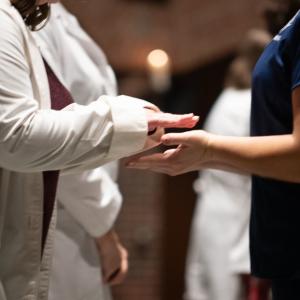
department page
Saint Anselm College student and alumni stories in support of the campaign for the Jean School of Nursing and Health Sciences.

department page
Story about Samuel Luther ’25 for the Campaign for the Jean School of Nursing and Health Sciences at Saint Anselm College.
department page
Story about Samuel Assantha ’26 for the Campaign for the Jean School of Nursing and Health Sciences at Saint Anselm College.
page
One of the core Catholic, Benedictine values is hospitality, which means welcoming all people to our community, regardless of faith or beliefs.
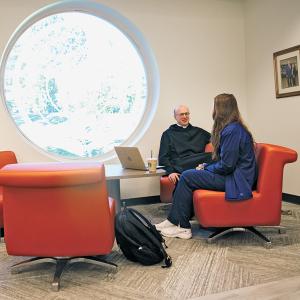
page
The purpose of the Student Government Association shall be to promote the best interests of the student body of Saint Anselm College, to foster a recognition of the rights of the student body, to promote active student participation in the operation of Saint Anselm College, and to program social, cultural and educational activities for the enjoyment of the Saint Anselm College community
page
There’s no reason to wait until graduate school to do real research. At Saint Anselm, we consider research an integral part of an undergraduate education, so no matter your major, you’ll find opportunities to study a subject in-depth.
Saint Anselm students are studying the development of cancer, compiling data on the Civil War, investigating media’s portrayal of women in politics. They’re pushing toward real breakthroughs. They’re even getting their names published in academic journals and presenting at conferences around the country.
In the labs and in the field, our students are gaining valuable skills and understanding of the world around them. Working one-on-one with faculty, they’re trained on equipment, terminology, and library resources, and can bounce ideas off each other and their mentors along the way.
Real research leads you to wider opportunities and career paths. With the help of faculty who are experts in their field and dedicated to your success, you’ll get into the graduate school of your choice or land the job of your dreams.
Saint Anselm students of all majors are researching, writing, performing, studying, and creating. The results of their work range from published papers to oil paintings to interactive poster projects, and are celebrated by the college through the annual S.O.A.R. Program. The series of events sponsored by S.O.A.R. showcases the outstanding research and artwork by our students across disciplines.
article
April 9, 2015 Vivian Fitzgerald graduated in May, 2014 from Saint Anselm College with a major in Psychology. She is originally from Chicago, and transferred as a junior from Stonehill College where she played volleyball. Her sophomore year she spoke to the volleyball coach here at Saint A’s, got recruited and fell in love with the campus which led to her decision to transfer. Vivian liked the sense of community and social awareness on campus, she commented that, “Saint A’s graduates aren’t just trying to make money, they are trying to make a difference.” Because of these experiences at Saint A’s, Vivian decided to work for a year post graduation for AmeriCorps Vista (volunteer service in the United States). Through AmeriCorps, she works for Campus Compact, a small nonprofit organization in New Hampshire. Their focus is to promote college awareness to high school students of low economic status. Viv was placed to work for the service and solidarity program through campus ministry at Saint Anselm, organizing service trips in the US and internationally. In her time at Saint A’s, Vivian was also a participant in these trips. Her senior research project, which was conducted in the Psych Department, focused on Examining Female Involvement in Sport Effect on Communication. She worked with Prof. Brady to replicate a study that looked at nonverbal communication styles in a lab setting. She recreated this in the psychology department observation room using the NOLDUS program to code behavior of athletes and non athletes. Vivian’s hypothesis was that female athletes have more male nonverbal communication tendencies than female non athletes. There were four main nonverbal characteristics she coded for including talking duration, fillers used in conversation, upper body movement, and lower body movement. Her hypothesis was supported and found an increase in all of the male nonverbal characteristics in the female athletes versus female non athletes. Vivian presented her research at the New England Psychological Association and won eighth place overall for her poster out of over one hundred other students. One of Vivian’s contributions to the Saint Anselm community is bringing the Special Olympics to Saint A’s because of her experiences volunteering at the Stonehill College Special Olympics. The next step for Vivian is to pursue a career in occupational therapy.
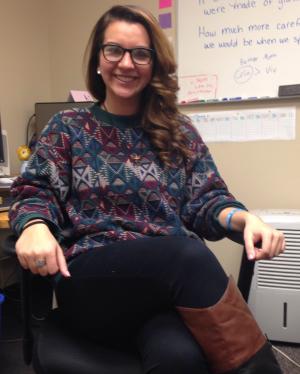
article
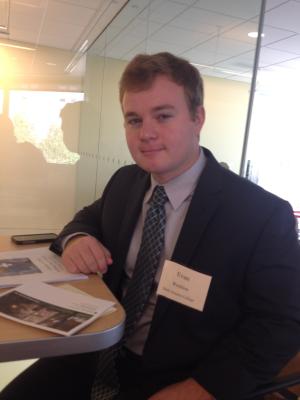
Last week, we sat down with Evan Rushton, '16 to discuss the research he has been working on with Psychology Professor Adam Wenzel. Evan presented his research at the New England Psychological Association (NEPA) Annual Meeting at Fitchburg State University on October 10th. 1. Could you briefly describe your research? We used a within-subjects design measuring for taste threshold and intensity. Before and after, subjects were given two taste modifiers, Miracle fruit, which turns sour tastes sweet, and Gymnema Sylvestre tea which suppressed sweet taste entirely. 2. What is your year of graduation and majors/minors? I am a senior psychology major with a minor in human relations and work. 3. How did you get involved with this research? Which professor are you working with?
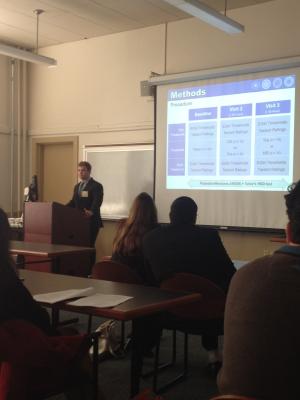
In relation to this research, Professor Wenzel and I collaborated. At the end of the spring semester sophomore year, an email went out about a summer research position related to the INBRE grant. INBRE (i.e., Idea Network of Biomedical Research Excellence) is a program that funds research opportunities for undergraduate students to work on biomedical research. I talked to Professor Wenzel about doing something with taste because whenever I would talk to him after class he would always mention something from the class I took with him, Sensation and Perception, such as the miracle fruit. I thought that it was pretty interesting so I was glad to get on board with the project. 4. What is the most valuable tool you have gained from being involved in research? I think the most important thing gained from being involved in research is experience. Since I am looking to go into graduate school, it is helpful to have experience especially if you are looking to go into a research-oriented field. Also, it gave me the independence and ability to organize a research project. Otherwise, I probably wouldn’t know how to go through the Institutional Review Board application and many other research procedures.
5. What advice would you give to incoming freshman about getting involved in research?
I would tell the freshman to definitely try to get a research position. Get as involved as early as possible with the department and develop a relationship with professors. Eventually you are going to need their help, and they are very helpful to say the least.
6. What are your plans after graduation?
After graduation, I would very much like to go into grad school, or get a job right out of college. I am interested in organizational psychology. If I go to grad school, I am interested in pursing a doctorate.
7. How do you think this experience will benefit your future goals?
In relation to the research that I did, even though it is not directly relatable to Industrial Organizational psychology, it gave me valuable tools in order to understand the research process.
article
Jacki Kinsman, an Anselmian alumni and former psychology major, recently obtained her doctorate in School Psychology at William James College. She talked with us regarding her experiences and offered some advice to current psychology majors. What were some of your favorite classes at the college and why? My favorite classes at Saint Anselm College were definitely my psychology courses. My very favorite psychology classes were taught by Professor Charlene Bonner. Psychology and Law and Abnormal Psychology were by far the most interesting. I loved her style of teaching because she taught us like grown-ups- we got what we put into it and she showed the best videos! She also told us a lot of personalized work-related stories, which is actually a big part of the reason that I decided to go for my doctorate. I also really enjoyed all of the Criminal Justice classes- as I was a Criminal Justice minor. I took a class Social Justice with Professor Humphrey. It was such an interesting class and for an end of the year project we could literally do whatever we wanted. I chose to write letters to death row inmates and they wrote back; thus starting an end of the year journal project. I have always loved to get into people's minds and figure them out. Did anything about Saint A's start you on your path to getting your doctorate? Both Professor Bonner and Professor Finn were extremely influential in starting me on my path to get my doctorate. They were driven and loved their jobs, but most importantly they always believed in me. I knew that I wanted me to be the best that I could be and that included going as far as I could with my education. I was horrible with math and was failing my statistics class at one point. I remember setting up a meeting with Professor Finn and breaking down into tears because I just didn't think I could do it. He spent endless hours after class helping me understand the world of statistics and always reminded me that I COULD do it- and I did (just barely)! Professor Finn also told me that there was one thing that I would never ever regret and that would be getting an education. People can take your job away, but they can never take away your education. He was so right; despite my mountain of student loans, I have never, ever, regretted getting an education. What was your senior thesis about? My senior thesis experiment was The Overlap Between Superstitious Behaviors and Obsessive Compulsive Symptoms in College Athletes. I chose this topic because I personally suffer from anxiety and I was also a student athlete at Saint A's. I played softball and I had a lot of superstitious behaviors that mirrored obsessive compulsive symptoms. My findings revealed that a lot of student athletes, specifically athletes from Saint Anselm College suffer from similar superstitious thoughts and OCD-like symptoms. How did Saint Anselm prepare you for the work you did post-graduation? My education at Anselm College was HARD. Graduate school was by far easier than undergrad. I tell people every day that graduate school took a lot of my TIME, but I was doing something that I loved. I understood it. Undergrad was hard because I had to take a broad range of classes, some that interested me more than others. However, Saint Anselm instilled in me a lot of determination, a strong work ethic, and really phenomenal writing skills. Some of this stemmed from the fact that most colleges do not require their psychology majors to write a thesis, thus setting Saint Anselm College apart from other schools. Are there any notable internship or volunteer experiences that helped you decide a specific area of Psychology to study? I decided not to do an internship at Saint Anselm College because I spent a significant amount of time outside of class as a student athlete. However, I made sure that I got involved wherever I could. I volunteered through the Melia Center and I did a lot of work at the Youth Development Center in Manchester and Webster House, a safe haven for troubled children. Working with these troubled youth really helped me decide upon an area that I wanted to concentrate in. I decided pretty early on that I wanted to become a Child Psychologist, and more specifically do some work in schools. Since then I have branched out to also do some work in the field of neuropsychology, by conducting evaluations for children and families. Do you have any advice for current Psychology Majors? My advice would be very similar to Professor Finn’s. You will never regret getting an education. If you truly like psychology, stick with it! There are many jobs that people with a bachelor’s degree in Psychology go on to do. If you truly love it, keep at it. For me, it is the most rewarding job in the world, and there is nothing else like it. If you have your heart set on becoming a psychologist, go for the gold- get that doctorate, I promise you, you will not regret it. This last question isn't related to academics, but do you have any notable memories about the Election period that took place during your time at Saint A's? Recently the school hosted a Republican debate and the school was very busy with that. I am somewhat embarrassed to say that I really tried to distance myself from politics, despite the fact that my best friend and four-year roommate Kaitlyn McClure '07 was VERY involved in it (at Saint Anselm College and now). I suppose my most notable memories stemmed from the work that she did. Kaitlyn's very own hard work and determination during the election period that took place during our time at Saint Anselm College got her to where she is now. A couple of years ago she was on Mitt Romney's campaign and worked on Capitol Hill in D.C. I suppose it ties to the overall theme of what I'm saying here- you can do absolutely anything with the right drive and determination- even work for a presidential candidate.
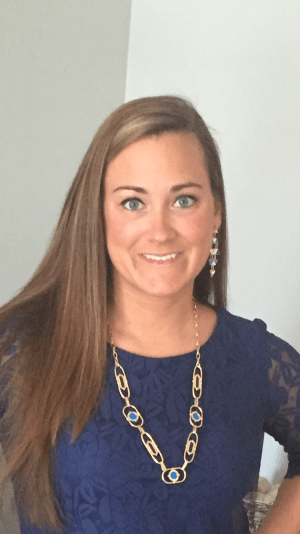
article
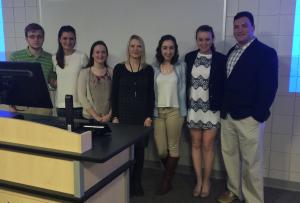
On Tuesday, April 12th the Saint Anselm Psychology Department hosted Dr. Susan McGurk from the Center of Psychiatric Rehabilitation at Boston University for the Annual Hechtl/Lasky Lecture Series. The series is in honor of former faculty members Richard Hechtl and Julian "Jack" Lasky, who were leaders in Saint Anselm College's psychology department, having devoted their careers to promoting wellness through basic and applied psychology research. Students have previously worked with Dr. McGurk on her research while she was at Dartmouth University, and she was excited to return to campus to present her current work. Dr. McGurk has won numerous awards such as the National Alliance of Research in Schizophrenia and Depression (NARSAD), the Young Investigator Award (1987-1990), the Independent Investigator Award (2010-2012), the 2004 Rehabilitation Practitioner of Distinction Award by the National Rehabilitation Association, and the 2007 Gerard Hogarty Award for Excellence in Schizophrenia Research. As part of the lecture series, students had the opportunity to meet with Dr. McGurk during a dinner and research presentation on campus.
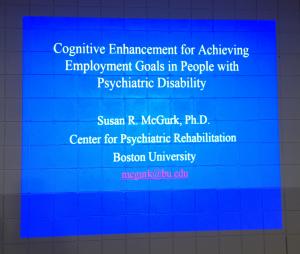
Dr. McGurk shared her experiences helping people with psychiatric disability achieve employment goals through her program called the "Thinking Skills for Work Program." This program is a multi-component cognitive remediation program combining computer practice of cognitive skills and the teaching of compensatory strategies in order to optimize cognitive and work functioning in persons receiving vocational rehabilitation services. McGurk has helped many people through this program to overcome challenges, improve their self-image, and maintain employment. Dr. McGurk is an inspiring researcher who has made great contributions to the psychology field, and it was a pleasure having her come share her knowledge with us on campus.